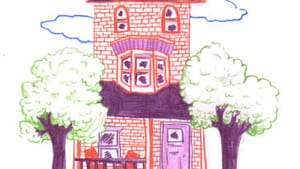Stay in the Loop
BSR publishes on a weekly schedule, with an email newsletter every Wednesday and Thursday morning. There’s no paywall, and subscribing is always free.
Moving on Down
BSR Scripts and Sips: R. Eric Thomas's 'The Folks at Home'

Okay, first of all, this play is not my life. So, yes, it’s about an interracial gay couple and I am one-half of an interracial gay couple. And yes, it takes place in South Philly, where I also live. But in The Folks at Home, the central couple, Brandon and Roger, own their house, whereas I rent. So there.
A house is not a home
Home ownership isn’t just the veil separating the autobiographical and the fictional: it’s a central issue in this play. Brandon and Roger, as the stage directions say, are doing the best they can here. They bought one of those two-story South Philly homes with a postage-stamp-sized backyard and a living room that bleeds into the dining room that bleeds into the kitchen. It’s located, I imagine, on a block made up of a mix of lifelong residents, new homeowners, college-student renters and probably an artist or two who bought from Trish Kelly. It’s a place, like a lot of South Philly neighborhoods, that is homey even as it transforms with time.
I think a lot about why a person buys a home. I know it’s a good investment, but I’m more of a stuff-money-into-a-mattress-just-in-case-I-need-to-flee-the-country-style financial planner. Nevertheless, it’s the thing we’re all led to, the act that marks a transition into a certain kind of adulthood, the outward investment in being a part of a community. It’s also, I think, an indicator that you can figure out how to get your hands on a large amount of money, which I am always interested in. A house, for me, the renter with money in his mattress, is a fascinating mix of life achievement and financial merit badge. But what happens when one part of the mix doesn’t work as well as the other? Does the house stop being a home?
Scratchin' and survivin'
I worked at a law firm that processed mortgage foreclosures for the big banks just after the financial collapse (so, you know, the Lord’s work). As I went about my daily task of processing claims like an automaton, I couldn’t help but be caught up with curiosity about the people behind the numbers. We got some details: names, ages, professions. Sometimes bits of narrative would slip through—a death, a layoff, an injury. But for the most part, the journey from homeownership to foreclosure remained a soulless mystery.
As you might have guessed, things aren’t looking good, financially, for Brandon and Roger. Their house is in preforeclosure when we begin the play. We quickly learn Roger’s parents have lost their house, also due to foreclosure, and Brandon’s mother has a disagreement with her landlord that leaves her without a place to stay. Suddenly the small South Philly house that was just starting to take on the shape and feel of home becomes Charlie’s overcrowded apartment from Willy Wonka and the Chocolate Factory.
I’m really interested in how we define home—is it the space, is it the family, is it the time, is it the money? In writing this play, I took a lot of inspiration from the '70s-era comedies of Norman Lear: Good Times, The Jeffersons, All in the Family, and others. These classics gave us wildly different portraits of families at home, wrestling with external and internal threats to their happiness. One of the ingenious things about Lear is that he was able to address political and social issues with humor and humanity. In so doing he made the point, time and time again, that while the details of our successes and our struggles may be different, our stories are often the same. And we’re all trying to come home at the end of the day.
Cocktail
The Special: A shot of Jim Beam and a PBR.
But replace Jim Beam with Philadelphia Blended Whiskey. (Yes, we have a whiskey distillery in Philly.) And replace the PBR with a craft beer like a Golden Monkey. Or just have a regular Special. Do whatever you want.
Click below for The Folks at Home script
Sign up for our newsletter
All of the week's new articles, all in one place. Sign up for the free weekly BSR newsletters, and don't miss a conversation.

 R. Eric Thomas
R. Eric Thomas
 Illustration by Hannah Kaplan
Illustration by Hannah Kaplan